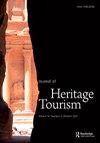拥有超越品牌的隐喻:来自佩拉宫文物酒店的证据
IF 2.2
Q2 HOSPITALITY, LEISURE, SPORT & TOURISM
引用次数: 0
摘要
本研究探讨了一些在文学、文化、政策和艺术方面具有重要背景的隐喻性历史事件如何为酒店业公司的品牌价值做出贡献,以及这些隐喻性历史事件如何对酒店业公司的品牌价值产生影响。本文章由计算机程序翻译,如有差异,请以英文原文为准。
Having metaphors beyond branding: evidence from a heritage hotel, Pera Palace
This study examined how some metaphoric historical events, endowed with an important background in literature, culture, policy, and art, contribute to the brand value for hospitality companies, wit...
求助全文
通过发布文献求助,成功后即可免费获取论文全文。
去求助
来源期刊

Journal of Heritage Tourism
HOSPITALITY, LEISURE, SPORT & TOURISM-
CiteScore
6.50
自引率
11.10%
发文量
39
期刊介绍:
The Journal of Heritage Tourism ( JHT ) is a peer-reviewed, international transdisciplinary journal. JHT focuses on exploring the many facets of one of the most notable and widespread types of tourism. Heritage tourism is among the very oldest forms of travel. Activities such as visits to sites of historical importance, including built environments and urban areas, rural and agricultural landscapes, natural regions, locations where historic events occurred and places where interesting and significant living cultures dominate are all forms of heritage tourism. As such, this form of tourism dominates the industry in many parts of the world and involves millions of people. During the past 20 years, the study of tourism has become highly fragmented and specialised into various theme areas, or concentrations. Within this context, heritage tourism is one of the most commonly investigated forms of tourism, and hundreds of scholars and industry workers are involved in researching its dynamics and concepts. This academic attention has resulted in the publication of hundreds of refereed articles in various scholarly media, yet, until now there has been no journal devoted specifically to heritage tourism; Journal of Heritage Tourism was launched to fill this gap. JHT seeks to critically examine all aspects of heritage tourism. Some of the topics to be explored within the context of heritage tourism will include colonial heritage, commodification, interpretation, urban renewal, religious tourism, genealogy, patriotism, nostalgia, folklore, power, funding, contested heritage, historic sites, identity, industrial heritage, marketing, conservation, ethnicity, education and indigenous heritage.
 求助内容:
求助内容: 应助结果提醒方式:
应助结果提醒方式:


